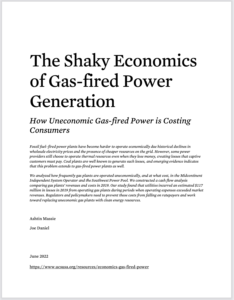Full Title: The Shaky Economics of Gas-Fired Power
Author(s): Ashtin Massie, Joe Daniel
Publisher(s): Union of Concerned Scientists
Publication Date: June 22, 2022
Full Text: Download Resource
Description (excerpt):
Many fossil fuel power plants across the country are no longer economic to operate year-round. Regardless, plant owners continue to burn coal or fossil gas when there are cheaper options—namely renewables—because public utility commissions allow them to charge their customers higher rates to cover their losses.
Midwest utilities and other electricity providers have been running their fossil gas power plants at a loss for the equivalent of three months on average a year. In 2019 alone, even when gas prices were at record lows, utilities in the 20 states covered by two electric grid operators—the Midcontinent Independent System Operator (MISO) and Southwest Power Pool (SPP)—socked their ratepayers for an extra $117 million.
Gas has become the US electric power sector’s primary fuel source, accounting for 38 percent of US electricity in 2021, up from 24 percent in 2010. In many cases, however, burning gas does not make economic sense. And even when it is economic to use, gas power plants emit toxic air pollution and contribute to climate change, both which disproportionately harm communities of color and low-income communities.
Regulators should stop utilities from forcing ratepayers to cover the cost of uneconomic gas-fired plants and remove the obstacles preventing renewable energy from lowering costs and cutting emissions. Likewise regulators should reject any plans to build new, uneconomic gas-fired power facilities and encourage electricity providers to replace their existing uneconomic gas-fired power facilities with economic alternatives, including renewable energy sources, storage, and energy efficiency programs.
